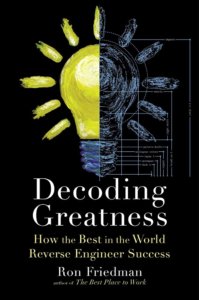If you liked Greene’s Mastery, Gladwell’s Outliers, or Duckworth’s Grit, you’ll like Friedman’s Decoding Greatness, which argues that while inborn talent and monumental effort can produce excellence, there’s another way to reach this brass ring that’s far more reliable, efficient, and effective.
Specifically, the premise of Decoding Greatness is that we can learn a lot about how to achieve greatness by reverse engineering the great accomplishments of others to discover the key mindsets, strategies, and tactics they used to achieve such feats.
And while many self-development books make similar promises—so much so that I almost skipped Decoding Greatness—I particularly enjoyed Friedman’s formulation for a few reasons:
- It’s fresh. Many books in the genre discuss how mindset, talent, perseverance, grit, practice, etc. generally relate to success and then encourage us to figure out how to apply them to our chosen endeavors, but this is often difficult to do. Friedman, on the other hand, believes that a more effective way to augment our abilities is to systematically analyze examples of the type of success we want to achieve and then develop highly tailored growth strategies based on our findings.
- It’s compelling. Friedman supports his claims with a well-rounded and engaging collection of instructional anecdotes, insightful analysis, and scientific research.
- It’s practical. Instead of simply giving success principles and leaving it to us to figure how to apply them to our circumstances and goals, Friedman filled the book with exercises for incorporating his teachings into our plans, strategies, and tactics.
- It’s easy to read. It’s written in a clear and conversational style that makes the material easily accessible.
So, if you’re looking for an evidence-based self-development book with a novel and immediately actionable path to more success in any task or undertaking, you’ll like Decoding Greatness.
My Top 10 Takeaways from Decoding Greatness by Ron Friedman
1
“In other words, if outright mimicry leads us nowhere and absolute novelty is met with scorn, the solution is to steer clear of both extremes. What gets noticed is the generally familiar with a minor variation.”
2
“What distinguishes, I think, great writers from people who are not great writers, or are not writers at all, [is] taste… Not taste in the sense of knowing what is good in an objective way—because there’s nothing objective to point you, there’s nothing to refer to out in the world—but knowing what it is that you yourself respond to and then making the leap of faith that if you respond strongly to something, there will be people in the world who also respond strongly.”
3
“In 2014, researchers at the University of Wisconsin examined the success rates of entrepreneurs, comparing those who quit their job to run a new business against those who played it safe and kept their day job while quietly developing their business on the side. Surprisingly, full-time commitment to a business venture did not turn out to be the winning strategy. Cautious employees were significantly more likely to succeed. Why? Because they possessed the financial stability to reach more patient, strategic decisions—a luxury not available to those whose livelihood was constantly on the line.”
4
“Observation alone is not enough for education, Dewey believed. Knowledge only comes about when we reflect on our experiences, revise our beliefs, and test our assumptions.”
5
“A crucial mistake to avoid anytime you’re working to develop a skill is to follow the same practice regimen for more than a few days. Predictability fosters boredom, and boredom is the enemy of focus, memory, and learning. Novelty, on the other hand, is an attention magnet. Our brains are naturally drawn to new features in our surroundings.”
6
“When talking to experts, three categories of questions are worth considering: journey questions, process questions, and discovery questions.
“Journey questions are designed to achieve two objectives: unearth the experts’ road map for success and remind them of their experience as a novice.
. . .
“Process questions get at the nitty-gritty of execution. They’re designed to illuminate the experts’ approach by drilling down on the specific steps they apply to bring their work to life.
. . .
“Finally, discovery questions focus experts on their initial expectations and invite them to compare those naive beliefs with what they know today. By directing experts’ attention to unexpected revelations, you get them thinking about useful insights they didn’t possess at the very beginning, back when they were in your shoes.”
7
“When it comes to learning, studies show that starting with examples—as opposed to abstract, theoretical lessons—leads to faster comprehension and fewer errors. It’s because examples are concrete, which both makes them easier to comprehend and prompts listeners to generate their own explanations, contributing to a deeper level of understanding.”
8
“Another approach to generating higher-quality feedback involves posing questions that target your weaknesses head-on. Comedian and playwright Mike Birbiglia has colleagues review his script and then asks, ‘When were you bored?’”
9
“In 2015, researchers at the University of Southern California made a fascinating discovery. Not all mistakes activate the painful anterior insula. Sometimes they activate the pleasurable ventral striatum. What determines which area lights up? It turns out that when mistakes are combined with new learning, we experience them as rewarding. The wisdom we gain allows us to see new opportunities for avoiding mistakes and succeeding in the future.”
10
“Having great taste and a clear vision are strong indicators of potential. Often, simply recognizing that something is not yet great and having the drive and tenacity to revise for as long as it takes is the difference between an amateur and a professional.”











